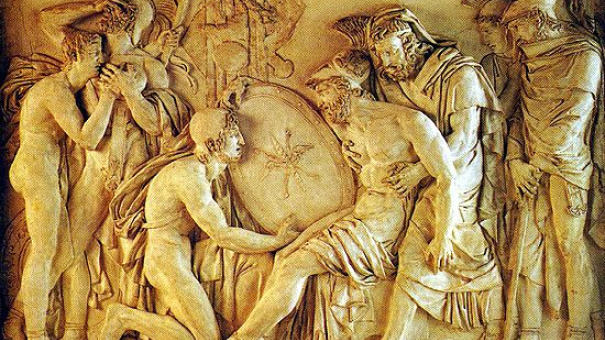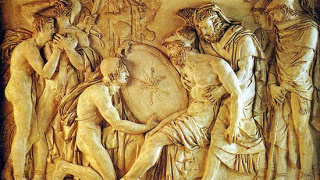Truth About Homosexuality in the Roman Empire
There are two opposed beliefs about homosexuality—or gay sex, or the more neutral and perhaps accurate term all-male sex—in the Roman Empire. The first is that the Ancient World fizzled out in an orgy of bum fun, and that we need to be careful not to let this happen to us. The second is that the Ancient World was one big al-fresco bath house. Both are false, though not equally so.
I begin with the first of these beliefs. Where do you begin with a belief so completely unfounded on the evidence? I suppose you look to the evidence. Alexander the Great and Julius Caesar both had a taste for all-male sex. So did Mark Antony. So did Hadrian. So had most of the famous Athenians – Euripides being one of its most notable enthusiasts. No signs there of moral or any other weakness. If Mark Antony came to a bad end, it was because he married an ambitious foreign woman.
A growing prejudice against all-male sex becomes visible in the fourth century, when Constantine established Christianity as the official faith. He made the first laws against it. Within a century, the Goths were across the Rhine and had sacked Rome. Oh, and one of Constantine’s own sons had a taste for Gothic boys!
It’s absurd to try correlating national greatness or decline with sexual customs. Ancient civilisation didn’t collapse because its rulers were too worn out from buggering each other to take up swords. The ultimate cause may have been a mild global cooling, which lowered the Malthusian ceiling. By this, I mean that falling crop yields made it harder for populations to maintain their accustomed standards of living. There was an undoubted growth of rural impoverishment that left populations open to the pandemic diseases that swept through the Mediterranean world from late in the second century. Population decline was then worsened by various forms of misgovernment, and by the need to hold frontiers that had only made sense in an age of economic and demographic expansion. Rather than bursting through in unstoppable floods, the barbarians seem eventually to have wandered, in small bands, into a demographic vacuum.
The second false belief is that the ancient world was one big al-fresco bath house. I once watched a television documentary in which it was seriously maintained that straight sex was out of fashion in Athens during the classical period. I thought of writing in to ask what books the researchers had been reading. A better response, though, is to look at the circumstances of ancient civilisation–at the wider forces that shaped sexual morality.
Because it lasted over a thousand years, and flourished on three continents, you should be careful with generalisations about ancient civilisation. But one good generalisation is that free men were expected to marry and beget children. These were societies with high death rates. They needed high birth rates not to die out. They particularly needed large numbers of young men to fight in their endemic wars of conquest or survival. Those men who wouldn’t breed were sometimes punished. Those who couldn’t were expected to adopt the surplus children of their poorer friends and relatives.
There were also strong prejudices against men who took the passive role in oral and anal sex. Take, for example, this epigram somewhere in Martial:
Secti podicis usque ad umbilicum
Nullas reliquias habet Charinus
Et prurit tamen usque ad umbilicum.
O quanta scabie miser laborat:
Culum non habet, est tamen cinaedus. [Of his anus, split right up to the belly button,
Nothing remains to Charinus.
And still he longs for it right up to his belly button.
O behold the poor dear’s itching:
No arse left, yet still he longs to be fucked.]
On the other hand, the ancients didn’t have our concept of gay and straight. Latin has a large and precise sexual vocabulary – though you won’t find meanings in the standard dictionaries. See, for example: Irrumator, one who presents his penis for sucking; Fellator, one who sucks; Pathicus, the passive partner in anal sex, Exoletus, the active partner; Cinaedus, a male prostitute; Catamitus, a boy prostitute or lover; Glabrarius, lover of smooth—skinned boys; Tribas, a woman with a clitoris large enough to serve as a penis – and so it continues. The Greek vocabulary is larger still. There is no word in either language that means “homosexual.” Sodomitus is a late word, brought in by the Christians, and may not have had its present meaning until deep into the Middle Ages.
So long as legitimate children were somehow begotten, and so long as he didn’t disgrace himself by taking the passive role, what else a free man did was legally and morally indifferent. Elsewhere in his works, Martial boasts of sleeping with boys, and scolds his wife for thinking ill of him. In Athens and some other classical city states, it was a social duty for men in the higher classes to have sexual affairs with adolescent boys. We all know about the Spartans. In Thebes, an army was formed of adult sex partners. If anyone had said that all-male sex was in itself wrong, he’d have been laughed at. The Jews, who did say this, were despised. The Christian Emperors may have made laws against it. They were mostly enforced against political enemies when no other charges were credible or convenient.
Indeed, while there was a prejudice, and sometimes laws, against sexual passivity, it’s obvious that, once in private, men did as they pleased. One of the fundamental rules of the man—boy affairs in Athens was no anal penetration and no fellatio. Sex was supposed to involve mutual masturbation or intercrural friction. You can imagine how that rule was kept in private. There were problems only if the truth got out. Philip of Macedon, for example, kept a boy as his lover. One day, in public, he poked the boy in the stomach and asked why he wasn’t yet pregnant. The boy was so outraged that he murdered the King.
Then we have slavery, and the total power of an owner over his slaves. A slave—owner could demand whatever he liked, and expect the world not to be told about what he liked. So long as they weren’t physically injured–and usually even then in practice–slaves were universally expected to do as they were told and not complain. As for prostitution, Rome and the larger cities were filled with brothels offering every sexual act imaginable. When Bible quotes failed, Christians were warned away from the brothels on the grounds that they might accidentally sleep with their own abandoned and enslaved bastard children.
I haven’t mentioned all—female sex. Nor, though, did most ancient writers. Everyone knows about Sappho. But we are more interested in her sexuality than any of the ancient critics. At best, the surviving writings about her deal with her tastes in casual asides, and only to explain the meaning of her text. This may seem curious. Women are at least as inclined to have sex with each other as men with each other – and human nature doesn’t change much in its fundamentals between different times and places. And the ancients were hardly reticent about sex. The reason, I think, is that, for the ancients, sex wasn’t sex unless an ejaculating penis was somewhere involved. Nothing else counted.
Let me cite another of Martial’s epigrams. This one is about a woman called Philaenis. In other epigrams, she is called lusca – that is, she has only one eye. In this one, she is called tribas – again, a woman with a very large clitoris. The opening lines go:
Paedicat pueros tribas Philaenis
Et tentigine saevior mariti
Undenas dolat in die puellas…. [Philaenis buggers boys,
And, crueller than a lustful bridegroom,
Deflowers eleven girls a day….]
As with the lines about Charinus, you could take this out of context as a sneer against same—sex intercourse. Martial ridicules Philaenis, though, not because she has sex with girls, but because she has abandoned the role assigned her by Nature, and is behaving like a man. Note how he begins with her apparently equal taste for sex with boys. This is not an anti—lesbian work, but an assertion of gender stereotypes. Later in the epigram, he takes issue with her taste for exercising in the gymnasium. Women were not supposed to behave like men. Whatever else they did – so long, of course, as it did not involve the wrong penis – wasn’t worth discussing. It seems that husbands didn’t regard lesbian affairs as adultery. It may also be that they weren’t worried if their women had sex with eunuchs – who were often cut late enough to be capable of erection and orgasm, though not to be capable of disgracing a man with bastard children.
Now to the much wider forces. I said above that a prejudice against all-male sex emerged around the fourth century. I also mention climatic change. I suspect there is a connection. A man is capable of having sex three or four times a day–even if only with himself. Whether he has time or inclination is another matter. Other things being equal, if he is having sex with a man, he will not, for a while at least, have sex with a woman. In an age when population is not in catastrophic decline, the moralists and authorities will tend to overlook all-male sex. It is, in demographic terms, a waste of seed, but there is plenty to waste. When population is in catastrophic decline, a prejudice is likely to emerge against all-male sex. Or it is likely to emerge when there is no decline, but there are settlement opportunities that require a population growing at full speed.
Therefore no mention of all-male sex in the poems of Homer. There was a world to be conquered and settled. No mention either in the pre—Classical age of Greece. There were cities to be built on the coast of modern Turkey and all over the Western Mediterranean. All-male sex is a luxury that becomes affordable in the Classical age. It begins to go out of fashion in the plagues that closed the Antonine Age of the Roman Empire. It comes into fashion again in the High Middle Ages, when population is growing. It goes out again after the Black Death, when new bodies are needed to fill every level in society. The Victorians abominated all-male sex, when they had vast and almost empty continents to fill with emigrants. We celebrate it, now that our countries are bursting with people. The writings of the moralists and lawyers mostly track the workings of these wider forces.
Of course, this is a general hypothesis, and should not be used as an explanation in itself. There are cultural and religious forces that are partly autonomous. For example, all-male sex should have gone out of fashion much more than seems to be the case after the time of Alexander, when there were new settlement opportunities, and everyone agreed that populations were in decline. The persecution of homosexuals in England after the Second World War took place against a rising birth-rate and a closing off of opportunities for emigration. But it is a useful hypothesis. If I didn’t have one already, it would keep a PhD student productively busy for a few years.
But I digress. The ancients were often more liberal about sex than we are. But they were not generally more liberal. They were governed by prejudices quite as strong as our own. But they were different prejudices. If they didn’t care about the gender of sexual partners, they were obsessed by many of the attendant circumstances.












